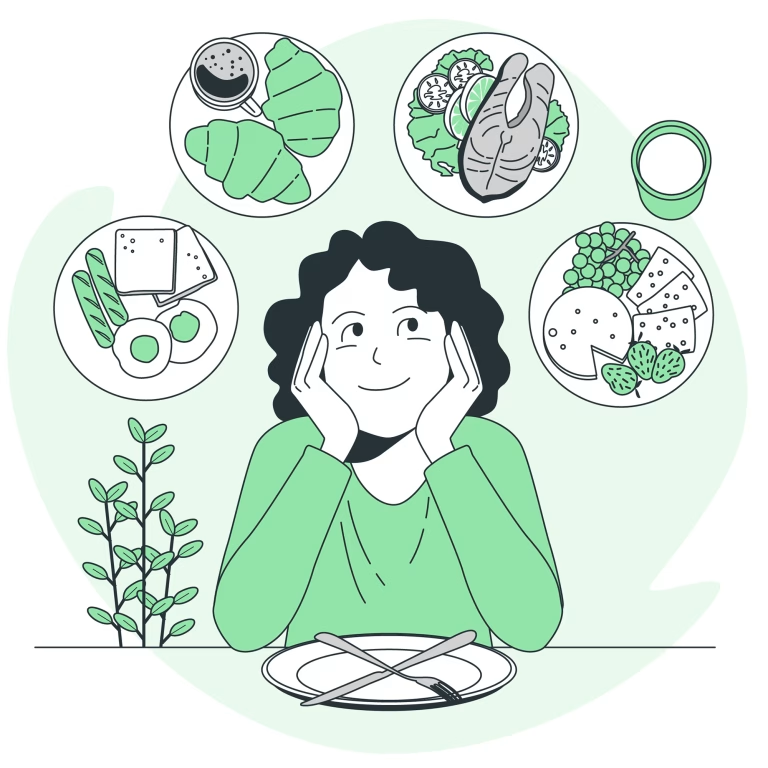Food. It’s no longer simply something we consume to nourish our our bodies. For many of us, meals is intertwined with our feelings—occasionally in approaches that aren’t wholesome. Emotional ingesting, a sample in which food is used as a coping mechanism to cope with feelings, can have an effect on our intellectual and physical nicely-being in profound approaches.
Whether it’s indulging in a pint of ice cream after a disturbing day at paintings, attaining for chips for the duration of moments of tension, or finding comfort in carbs for the duration of instances of unhappiness, emotional eating is extra commonplace than many understand. In this post, we’ll dive deep into the psychology at the back to stop emotional eating, the connection between emotions and food, and most significantly, techniques for overcoming emotional ingesting habits.

What is Emotional Eating?
To stop emotional eating, one should understand what emotional eating really is? Emotional eating happens when individuals eat in response to emotions, in place of bodily hunger. It’s not actually about enjoying meals in social situations or savoring a special meal—it’s while food turns into a way to appease emotional distress. This conduct is regularly related to emotions like strain, unhappiness, tension, boredom, loneliness, or frustration.
Many humans flip to meals as a source of consolation at some stage in hard feelings due to the fact it could provide an instantaneous, transient relief. Food can cause the discharge of experience-good chemical compounds in the brain, which includes dopamine and serotonin, developing a experience of delight or calm. Unfortunately, this remedy is fleeting, and emotional ingesting frequently results in emotions of guilt, disgrace, and self-complaint, specially whilst it becomes a ordinary coping mechanism.
The Emotional and Psychological Roots of Emotional Eating
To stop food addiction, we should Understand the root causes of emotional eating that requires us to explore how our feelings and brain engage with meals. Here are a few key facts in psychology of food, and psychological elements that make contributions to emotional eating:
Stress and the Stress Response
When we’re stressed, our bodies launch hormones like cortisol, that could increase urge for food, specially for meals excessive in sugar, fat, and salt. This response is evolutionary—our ancestors wanted electricity-dense ingredients to live to tell the tale in times of risk. In the modern global, however, the strain reaction can lead to overeating, specifically while we are not certainly hungry however alternatively trying to manipulate emotional discomfort through food addiction.

Emotional Regulation and Food
For some, meals turns into a coping mechanism to manage overwhelming feelings. Instead of confronting tough emotions like disappointment, anger, or anxiety, people may also turn to meals to numb or distract themselves that results in food addiction. Eating, in particular comfort foods, gives brief alleviation from negative emotions, however it doesn’t deal with the underlying emotional difficulty, main to a cycle of emotional eating.
Childhood Experiences and Food Associations
Our dating with food regularly starts often involved in childhood. Many people develop up associating food with comfort or rewards. Parents may use meals to soothe a toddler after a tantrum or provide treats as a shape of reward. Over time, those early institutions can evolve into styles of emotional eating, where meals is seen as a source of emotional consolation. These conduct may also persist into maturity, making it hard to break the cycle and develops food addiction according to psychology of food.

Self-Soothing with Food
When people experience loneliness, disappointment, or boredom, meals may be used as a manner to self-soothe. Eating gives people something to cognizance on, presenting a sense of manage or comfort in moments of emotional misery. However, because the basis reason of the emotion is not addressed, the cycle continues. The extra an person relies on food for consolation, the greater it will become ingrained as a coping mechanism.
The Impact of Emotional Eating on Mental Health
While meals may also provide temporary comfort from emotional misery, emotional eating has a negative lengthy-term effect on both intellectual and physical health. Here’s how:
Guilt and Shame
After bingeing or overeating in response to emotions, many human beings sense responsible or ashamed. These bad feelings can exacerbate the unique emotions of misery, creating a vicious cycle of emotional consuming. The shame often leads to self-complaint, which may additionally in addition perpetuate bad eating conduct and make a contribution to low vanity and body photo problems.
Increased Anxiety and Depression
Although emotional consuming can provide short-term consolation, it would not cope with the underlying emotional causes of anxiety or despair. Over time, this could exacerbate emotions of misery, creating a cycle in which meals will become a crutch, however the character nevertheless struggles with their emotions.
Weight Gain and Physical Health Issues
In many instances, emotional eating includes ingesting meals which are high in sugar, fat, and salt—foods that could make contributions to weight advantage and other bodily fitness issues like coronary heart sickness, diabetes, and digestive problems. The introduced pressure of gaining weight or now not feeling true in one’s body can contribute to extra emotional distress, making the cycle of emotional eating even harder to break.

How to Stop Emotional Eating?
Breaking free from emotional ingesting isn’t always an clean method, but it’s far viable. It requires mindfulness, self-compassion, and a shift in how we relate to meals and feelings. Here are a few techniques for overcoming emotional ingesting:
Recognize the Triggers
The first step to stop emotional eating and breaking the cycle of emotional consuming is to discover the emotional triggers that spark off the behavior. Is it pressure? Boredom? Loneliness? Keeping a meals and mood magazine can be pretty helpful. By monitoring what you are ingesting and the emotions you feel on the time, you could start to see patterns and pick out when you’re ingesting for motives aside from starvation. Once you apprehend your triggers, you could start to take proactive steps to address them with out turning to meals.
Practice Mindful Eating
Mindful consuming involves paying full interest to the revel in of ingesting—savoring each chew, noticing how food makes you experience, and being attentive to your frame’s hunger and fullness cues. By slowing down and being extra intentional about ingesting, you could start to differentiate between real starvation and emotional starvation. Mindful consuming enables prevent mindless snacking and encourages a healthier, extra balanced relationship with meals.
Develop Healthy Coping Mechanisms
Instead of reaching for food to deal with feelings, try other healthful shops for stress and poor feelings. Exercise, journaling, deep breathing, or meditation can help calm your mind and adjust feelings. Creative activities like painting, song, or writing also can be extremely good ways to process and release feelings. Building a toolbox of coping techniques that don’t contain food will make it less difficult to manipulate your emotions in a wholesome manner and will be helpful to stop emotional eating.

Build Emotional Awareness
Emotional awareness is prime to stop emotional eating and emotional ingesting. Developing an expertise of your feelings and how they happen to your frame allow you to grow to be greater aware of whilst you’re turning to food as a manner to keep away from or numb emotions. Therapy or counseling, mainly cognitive-behavioral therapy (CBT), may be beneficial in supporting individuals learn to become aware of and paintings via feelings in a wholesome, positive way.
Practice Self-Compassion
Overcoming emotional consuming is a procedure, and it’s vital to be kind to your self alongside the way. Everyone reviews setbacks and demanding situations, so don’t be too tough on yourself if you slip up. Practice self-compassion through treating your self with the equal kindness and know-how which you could offer to a friend. Remember, alternate takes time, and breaking old habits is a adventure.
Seek Professional Help
If emotional ingesting has grow to be a chronic trouble, it is able to be helpful to are trying to find guide from a therapist, nutritionist, or a aid institution. A expert let you explore the deeper emotional roots of your eating behavior and provide customized techniques to control them.
Conclusion
Emotional eating is a commonplace trouble, however it’s no longer some thing that human beings need to face alone. By understanding the psychological roots of emotional consuming, recognizing triggers, and studying new strategies to manage emotions without relying on food, people can build a healthier relationship with each meals and their emotions. It’s no longer approximately “solving” your self but as an alternative taking small, regular steps closer to self-cognizance and self-compassion.
Remember, recuperation takes time, and every breakthrough—no matter how small—is a victory. You have the electricity to interrupt the cycle of emotional ingesting and build a more balanced and pleasing life.
This submit delves into the multifaceted dating among food and feelings, supplying actionable advice and realistic techniques for overcoming emotional ingesting. Whether you’re suffering with emotional consuming or definitely curious approximately the relationship between food and mental fitness, those insights can serve as a helpful manual for starting the journey in the direction of restoration and self-attention.




Thanks for sharing. I read many of your blog posts, cool, your blog is very good.